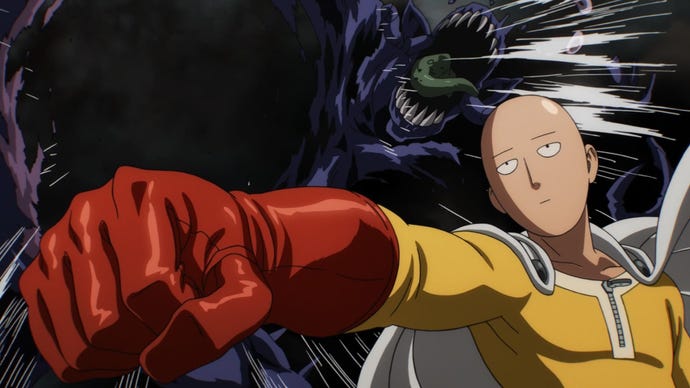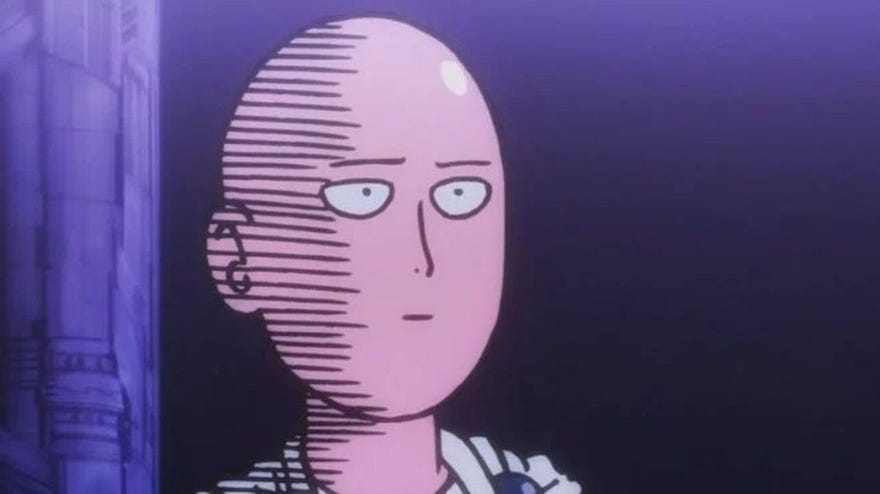What can grindy live service superhero games learn from One-Punch Man?
Not a one-word article
One-Punch Man is a manga, anime and nowadays, videogame series that began life as a webcomic in 2009 - a drawing exercise for budding artist "One" that found popularity and evolved into a full-bore parody of the shonen action genre. One-Punch Man himself, aka Saitama, is essentially a NEET Superman - an apathetic homebody in yellow pants and red wellies who begins his story as the most powerful superhero in existence, for reasons unexplained.
The result is a comedy with exactly one punchline that is also the title. It should get old fast. One reason it doesn't is that most other One-Punch characters fail to notice Saitama's strength, because Saitama sucks at building his brand. His victories over supervillains - often achieved while doing chores such as wig-shopping, and occasionally by accident - are generally attributed to less potent, but more entrepreneurial members of the broader Hero Association, who initially register Saitama as a C-class hero because he failed his written exam. Saitama's terrible PR also allows the manga and anime to shift the focus to those other superheroes, creating a bunch of wider narratives in which Saitama plays the role of perpetually overlooked and absent-minded deus ex machina.

Another reason One-Punch Man's humour doesn't get old is that Saitama is Mother Nature's revenge on world-building and the endlessly multiplying ranks of super-characters with silly and convoluted origin stories - what Alice B summarised more positively earlier this week as the act of throwing spaghetti at the wall to see what sticks. Saitama doesn't like backstory. He is the ultimate cutscene-skipper and audio-diary-ignorer, with minimal interest in the wider workings of his world and thus, minimal patience for the various sea gods, edgy ninjas and escaped lab experiments who rock up to monologue at him about their motivations and prowess. While the mangas do gradually nudge him into more typical hero territory, with an appropriately overclocked arch-nemesis, each episode or chapter's dramatic arc is ultimately defined by how long it takes Saitama to realise that he's bored and delete whatever it is that's boring him.
One-Punch Man was my introduction to the genre of "overpowered main character" manga and anime, which I have pretty mixed feelings about. A lot of overpowered MC stories are cheesy/sleazy boy's wish fulfilment. The MC is generally a bloke, who often gets some kind of fawning female entourage, with an underlying theme of putting superheroines back in the kitchen. One-Punch Man is better than most, but it's no great work of positive representation: there are basically two women who have any kind of plot agency, and the male cast includes some arguably racist and definitely homophobic caricatures. I was going to write that these elements are more obnoxious when One-Punch Man forgets that it's a comedy, but perhaps they're worse when it commits to the farce, because it allows the shitty stereotypes to skim by on a cloud of irony.
Still, I can't deny that I find One-Punch Man funny. A lot has to do with the shifting art style: when Saitama tries to take himself seriously, perhaps because he's giving bullshit advice to his awestruck underling Genos, his appearance evolves from spoofy webcomic simplicity to a keen-eyed and rugged "heroic" rendition - generally, the setup for a joke at his expense. And I do wonder whether there's anything to be gained from applying the Overpowered formula to latter-day blockbuster videogames with live service components, where character potency has essentially become an in-game currency.
 One Punch Man: World - Official Launch Trailer - PLAY NOW!
One Punch Man: World - Official Launch Trailer - PLAY NOW!
There aren't many One-Punch Man games as yet, and those that do exist aren't exactly platinum-grade bangers, but I always enjoy watching developers struggle to adapt the character faithfully without letting you complete the game in five minutes. Take One-Punch Man World, a third-person arena brawler with some RPG flourishes, which launched a week or two back. The workaround here is that you can play as an underpowered, pyjama-clad version of Saitama, plucked from a dream Saitama has in one chapter about fighting enemies who actually pose a challenge.
A couple of years ago there was One-Punch Man: A Hero Nobody Knows (thanks to Alice0 for the reminder), which builds a fighting game mode around the gag that Saitama is necessarily late to every major encounter in the manga and anime. Pick One-Punch Man from the roster, and you'll start the round as a lesser hero like the charmingly pathetic BMX-wielding Mumen Rider, who must drag out the match and hold the villain off till Saitama arrives.
 One Punch Man: A Hero Nobody Knows - Launch Trailer | PS4
One Punch Man: A Hero Nobody Knows - Launch Trailer | PS4
Thinking about these cheeky responses to the question of a protagonist who can one-shot everything makes me think about how the videogame protagonist lethality curve has become a business model. Not just in the classical sense that an action game is often more fun if the opposition start weak and get tougher - there's now a swathe of live service offerings which are about checking and pacing the player's accumulation of power day to day, month to month, year to year. One inevitable consequence is that live service games featuring superheroes often don't feel very superheroic, because while superheroes might have to face formidable opponents and endure setbacks, they shouldn't have to actually grind. They should not have to check in and collect their dailies, farm the mobs or run the weekly raid so as to stay ahead of the curve - the kind of humdrum workaday mentality satirised by One-Punch Man's Hero Association, with its power ranks and entrance exams.
We see this dilution of superheroism in photonegative in Rocksteady's Suicide Squad: Kill The Justice League - here's our review - which I'm going to grandly represent as the persistent online loot-and-level 'em up's final, dreary triumph over the various comicbook crusaders caught in its gravity. Here, you play a bunch of not-excessively-super villains who wear down and destroy the gods in DC's line-up, including Superman, by dint of steady upgrades and the acquisition of flashier guns. Rocksteady were once rumoured to be making a Superman game, prior to Suicide Squad. Insiders have recently denied this to no less a personage than emperor-journalist Jason Schreier, but I still entertain hopes of glimpsing that purely hypothetical project somewhere inside the tissues of Suicide Squad's loot-addled Metropolis - and given the game's disastrous reception, I think publisher Warner would do well to look again at that rumour's dogged persistence.
But perhaps they and other videogame companies should also spend some time thinking about One-Punch Man videogames, and the ways in which absolute overpower might be handled at the level of narrative and design. In an amusing twist, Suicide Squad sort of launched as a One-Punch game: thanks to an early access bug that appears to have been fixed, some players signed in to find the game already completed, much as Saitama wakes up one day to find that he is the apex of his universe. Perhaps there's scope for a cool game jam here - dedicated to Saitama or Superman or just superheroes in general - in which the creators of videogame action epics thrash out the exciting problem of characters defined by the absence of equals.










